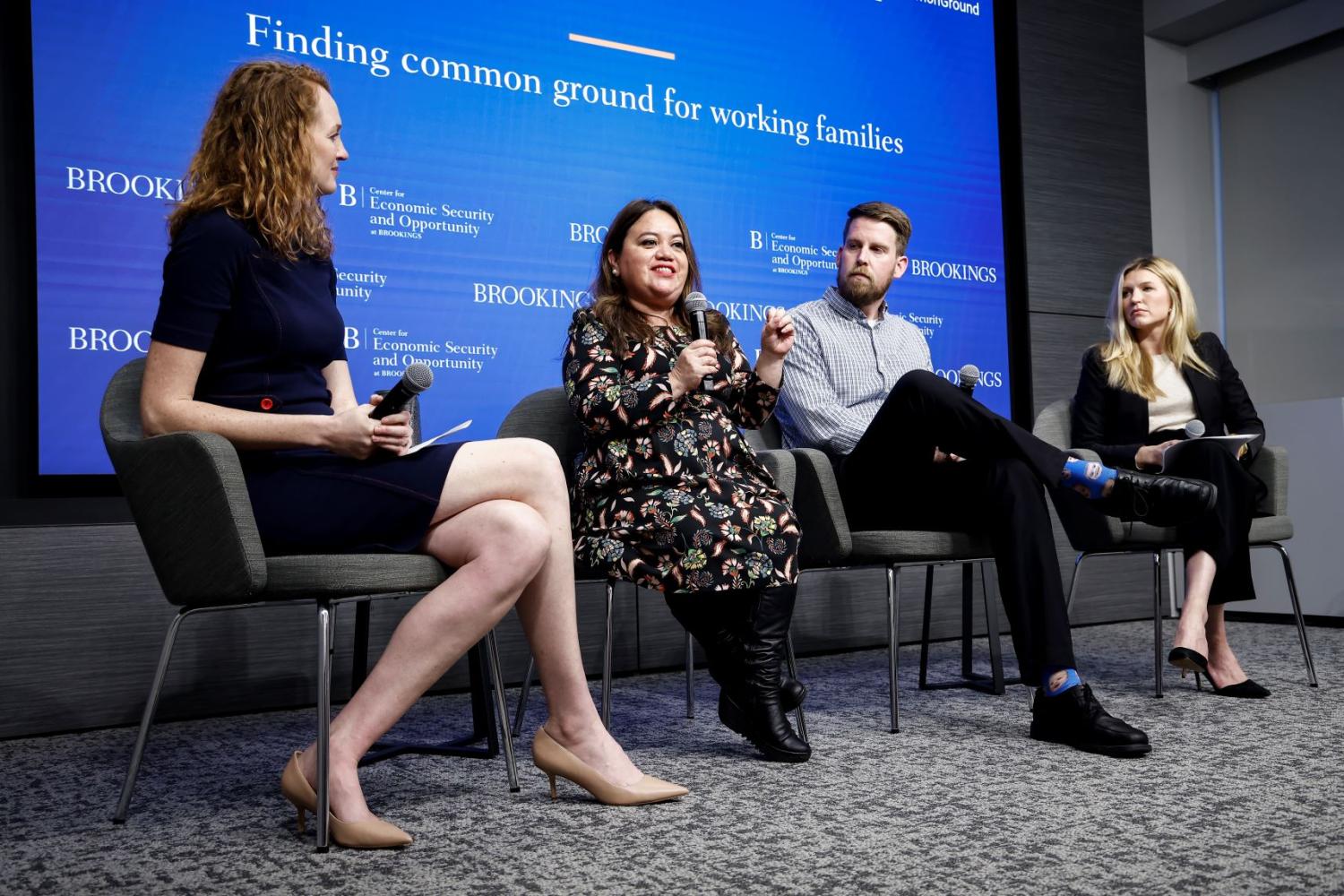This is a summary of an event held on April 3, 2024. You can watch the full video of the event here.
In a landscape marked by entrenched ideologies, the pursuit of common ground is often viewed as an elusive goal. On April 3, 2024, the Center for Economic Security and Opportunity (CESO) at Brookings hosted an event , Finding Common Ground for Working Families, featuring two panels. The first panel was moderated by Molly Kinder, fellow at Brookings Metro, and discussed the Convergence Collaborative’s blueprint for action on challenges faced by working families with young children. The second, moderated by the New York Times’ Jessica Grose, focused more broadly on fostering mutual understanding on polarizing issues.
Finding common ground for working families
Abby McCloskey, founder of McCloskey Policy LLC, opened by recapping the blueprint that emerged from the Convergence Collaborative process: changing the story, rethinking cash support for families, ensuring more high-quality care options for children, and supporting parents with infants and adopted children. The blueprint calls for action from policymakers, employers, philanthropy, and communities. Drawing from this experience, she highlighted the transformative power of relationships forged through intentional bipartisan collaboration.
In the panel discussion, Lina Guzman, chief strategy officer and director of the Hispanic Institute at Child Trends, emphasized the need for tangible outcomes and actionable recommendations in addressing complex societal challenges. She noted: “Families do not function in silos. They don’t have siloed needs … Families’ needs are complex, and what they do need … are supports around time, money, and care support, and caregiving”
Guzman also spoke to the interconnectedness of family needs, and the benefit of thinking holistically to ensure the economic well-being of families, rather than narrowly addressing one policy domain.
Joshua McCabe, director of social policy at the Niskanen Center, underscored the challenge of navigating budgetary constraints and competing policy priorities. He also emphasized the value of taking a holistic approach to policymaking, which requires considering strengths, weaknesses, and interdependencies across various policy areas.
The panelists agreed that by adopting a comprehensive perspective and bringing together people with divergent beliefs and ideologies, policymakers can better understand the complex needs of families and develop more effective solutions that transcend traditional policy silos.
Fostering understanding in polarized discourse
Stuart Butler, a senior fellow in Economic Studies at Brookings who has participated in the Convergence process and serves on the Convergence board, highlighted useful tools to foster empathetic and fruitful dialogues. “The use of professional mediators and facilitators … Abby described it as couples’ counseling … this is very much the case of a professional looking at people who argue with each other and getting to the bottom of how they can come to agreement.” He also noted how easy it is to discover commonalities in seemingly polarized settings by engaging in vulnerable conversations and goal-sharing.
Maya MacGuineas of the Committee for a Responsible Federal Budget underscored the challenges posed by the erosion of “off-the-record” discussions in today’s digital age, elucidating the importance of building trust among stakeholders in policy discourse.
Lindsay Torrico, senior vice president of bank community engagement and executive director of the American Bankers Association Foundation, emphasized the critical role of active listening in both mediated discussions and everyday social settings. She highlighted the tendency for many individuals to prioritize speaking over listening. Butler agreed and stressed the importance of seeking opportunities to identify the underlying values driving peoples’ statements.
Hope amidst polarization
Jessica Grose, reflecting on her experiences reporting on Generation Z and their evolving political beliefs, pointed out that despite witnessing intense political rhetoric, Gen Z individuals steer away from extremism. Grose highlighted the exhaustion felt by many young adults who came of age during a tumultuous political era, a trend that might lead to a generation that values dialogue amid the prevailing polarization.
-
Acknowledgements and disclosures
The Brookings Institution is financed through the support of a diverse array of foundations, corporations, governments, individuals, as well as an endowment. A list of donors can be found in our annual reports published online here. The findings, interpretations, and conclusions in this report are solely those of its author(s) and are not influenced by any donation.
The Brookings Institution is committed to quality, independence, and impact.
We are supported by a diverse array of funders. In line with our values and policies, each Brookings publication represents the sole views of its author(s).



Commentary
Key takeaways on overcoming polarization to help working families
April 8, 2024